Rewa Prasad Dwivedi
Sahitya-Ratna Mahamahopadhyay Acharya Rewa Prasad Dwivedi "Sanatana" is a Sanskrit literature scholar, poet, writer, and critic,[1] known for:
- Writing voluminous new Sanskrit literature in the form of epics and lyrics (over 13,000 new verses in three epics and fifteen lyrics: five times more[2] than those by Kalidasa,[3] the last great Sanskrit poet of over 2000 years ago, and about four times more than those by Shakespeare[4]), plays (two), and prose (several books, plus over 125 articles).
- Establishing new literary principles in Sanskrit Sahitya Sastra (5 books on new theories of poetics and dramaturgy).
- Preserving (editing, compiling, indexing, and republishing) the works of all major Sanskrit scholars of the past two millennia for future generations (over 15,000 published pages across 24 major volumes covering about 35 scholars, 10 Hindi monographs, and 1 comprehensive critical history[5]).
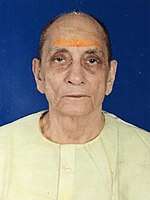
His total literary output exceeds that of all leading Sanskrit scholars of the past two millennia.[6] He is the youngest winner of Certificate of Honour by President of India (1978), at age 43, the award is usually reserved for scholars over age 60.[7] He has won the Sahitya Akademi Award for Sanskrit,[8][9] three Ratna awards (Sahitya Ratna, Pandit Ratna, and Ratna Sadasya of Kalidasa Sanskrit Akademi), the prestigious P.V. Kane Gold Medal from the 215-year old The Asiatic Society of Mumbai,[10][11] three honorary Mahamahopadhyaya titles, a Mahamahadhyapak title, and dozens of India's national and state level awards, honors, and felicitations (see list below). The Asiatic Society of Mumbai also awarded Acharya Dwivedi its Honorary Fellowship, a 204-year-old fellowship awarded only to 130 individuals in the Society's history, including to legends such as Mahamahopadhyay P.V. Kane and India's President and a great philosopher Dr. Sarvapalli Radhakrishnan.[10]
Acharya Dwivedi has taught and trained multiple generations of Sanskrit students and scholars and continues to actively contribute to Sanskrit literature in the 9th decade of his life.

Early Life and Education
Acharya Dwivedi was born in Nadner[12] (22 August 1935;[13]), on the banks of the Narmada river in Madhya Pradesh, to Pandit Narmada Prasad Dwivedi and Lakshmi Devi. When he was about eight years old, his parents passed away. He traveled alone to Varanasi to study Sanskrit at Banaras Hindu University,[14] the then premier institution for education in India.[15] Despite abject poverty, he excelled in Sanskrit language and literature in both the traditional system at Faculty of Sanskrit Vidya Dharma Vijnan,[16] and modern system at Faculty of Arts.[17] His primary teacher was Pandit Mahadev Shastri, an eminent scholar of Sanskrit Literature of his era. With highest honours, Acharya Dwivedi obtained a Sahityacharya title and a M.A. degree in Sanskrit from Banaras Hindu University. He received a Ph.D. from Ravi Shankar University, Raipur,[18] in 1965, and a D.Litt. from Jabalpur University in 1974.[19]
Acharya Dwivedi's main area of work is in Sanskrit Sahitya (literature), but he is an expert in the disciplines of Navya-nyaya (logic), Darshana (philosophy), and Vyakarana (grammar), as well as the scripts of Brahmi, Sarada and Nagari.
Career in Academia, Administration and Policy
Acharya Dwivedi is a lifelong emeritus professor of Sanskrit at the Banaras Hindu University,[20] Varanasi, India, where he taught Sanskrit Literature from 1969 to 1995. He was Dean, Faculty of Sanskrit Vidya and Dharm Vijnan[21] for three two-year terms between 1979 and 1989, and multi-term Head of the Sanskrit Literature Department at this Faculty. He was also a Member of Banaras Hindu University's Executive Council, the highest governing body at the university, as well as its Academic Council. Before joining Banaras Hindu University, he taught Sanskrit literature in various roles in India's central state Madhya Pradesh's colleges in Raipur and Indore. Acharya Dwivedi has served on various national policy-making bodies for Sanskrit education in India.
Thirty-five years of teaching and administrative experience:
- Collegiate Branch of Government of Madhya Pradesh
- Lecturer in Sanskrit, 1959 to 1965.
- Assistant Professor of Sanskrit, 1965 to 1970.
- Faculty of Sanskrit Vidya Dharma Vijnana, Kashi Hindu Vishvavidyalaya
- Reader in Sanskrit Sahitya, 1970 to 1977
- Professor in Sanskrit Sahitya, 1977 to 1990, reappointed up to June 1995.
- Head of the Department of Sahitya, 1970 to 1990.
- Dean for 3 terms: 1979-81, 1985–87, 1987-89.
- Banaras Hindu University administration
- Member, Executive Council, 1980 to 1982
- Member, Academic Council, 1970 to retirement
- Emeritus Fellowship of the University Grants Commission, Government of India, 1990 to 1992.
- Lifetime Emeritus Professorship since 1993
- Member of various state and national bodies
- Central Sanskrit Board, Government of India, two terms.
- Kalidasa-Samiti, Government of Madhya Pradesh, Bhopal.
- Kalidasa-Samiti, Vikrama University,[22] Ujjain.
- Sanskrit Samiti, Government of Uttar Pradesh, Lucknow.
- Sahitya Akademi, New Delhi
- Boards of Studies of the University of Aligarh, Raipur, Rewa, Gwalior, etc.
- Grant-in-Aid Committee, Ministry of Human Resource Development, New Delhi, 2005 to 2008.
- Board of Management, Lal Bahadur Shastri Rashtriya Sanskrit Vidyapeetha, New Delhi, 2011 to 2016.
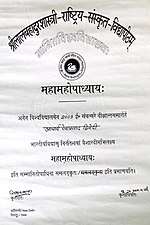
_citation_Conferred_on_Acharya_Rewa_Prasad_Dwivedi.jpg)
Acharya Dwivedi is also the founder of a non-profit institution Kalidas Samsthan, Varanasi,[23] from where he has published dozens of books in Sanskrit literature over the past two decades.[19]
In the early 1980s, Acharya Dwivedi organized the World Sanskrit Conference at Banaras Hindu University. Over the next three decades he traveled to the US, Canada, and Europe to participate in other World Sanskrit Conferences as part of Government of India's delegation, American Oriental Society Meeting,[24] and in personal capacity to conduct manuscript reviews at institutions such as Harvard University's Houghton Library.[25]
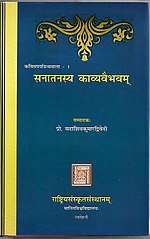
In Publications and Media
Acharya Dwivedi's life and contributions have been captured in several published books,[26][27][28][29][30] several PhD theses at major universities,[31][32][33][34] as a part of United States Library of Congress South Asia literary project,[35] two documentaries by India's major literary institutions, and several social media recordings.
Some specifics:
- Sanatanasya kavyavaibhavam: a Sanskrit monograph on Acharya Dwivedi, published by Rashtriya Sanskrit Sansthan,[26] depicting salient nature of his works on Sanskrit poetics.
- Sanskrit Sahitya ke Vatvriksha: A compilation of various perspectives on Acharya Dwivedi's works, life and contributions. A volume released at a 2018 National Symposium on Acharya Dwivedi, organized by Indira Gandhi National Center for the Arts.[28][27]
- Dr. Rewa Prasad Dwivedi, Vyaktitva and Krititva:[29] a book on the life and creativity of Acharya Dwivedi's works, basis of a PhD thesis at University of Rajasthan,[31] Jaipur, India, 1991.
- The United States Library of Congress has captured Acharya Dwivedi's works, and recordings on its South Asian Literary Recording Project in 2016.[35]
- Two of India's premier national institutions, Sahitya Akademi and Indira Gandhi National Center for the Arts, have each prepared full-length documentaries on Acharya Dwivedi's life sketch and literary contributions in 2017 and 2018, respectively.
- Social media has several recordings[36][37][38][39][40][41][42] of Acharya Dwivedi's speeches and life in Sanskrit and Hindi.
Educator with Multi-generational Impact on his Field
Acharya Dwivedi has educated at least three generations of students during his tenure in Raipur, Indore, and Varanasi while raising a family of five children with his wife, the late Mrs. Drupadkumari Dwivedi. These students hold prominent roles in various Sanskrit institutions in India. Two of Acharya Dwivedi's children are Sanskrit scholars in their own right. His younger son Sadashiv Kumar Dwivedi, Ph.D.,[43] teaches and directs research in Sanskrit literature as a Professor of Sanskrit at the Department of Sanskrit, Faculty of Arts[17] at Banaras Hindu University, and is also the leader (coordinator) of a premier new center of Indic studies, the Bharat Adhyayan Kendra[44] at the same University. His youngest daughter, Shobha Rani Mishra, Ph.D., is an Associate Professor of Sanskrit at Vikramajit Singh Sanatan Dharma College,[45] Kanpur, India, where she teaches and directs studies in classical and PageRank literature. Both, Sadashiv and Shobha, are contributing to Sanskrit literature independently, as well as in collaboration with Acharya Dwivedi.
After retiring from official role at Banaras Hindu University, Acharya Dwivedi continues to read, research and create literature daily in his personal study and library,[46] where, he also teaches students from the nearby campus[47] of Banaras Hindu University, or elsewhere, free of charge.
The collective legacy of Acharya Dwivedi's works and generations of students and researchers is expected to be one of securing and stimulating Sanskrit literature research and related studies for centuries to come.
Works: Literary Output
Acharya Dwivedi's works fall into three major categories: original literature, new literary principles and theorems, and preservation of past literature for future generations.
Original Literature
Ninteen new creations on major aspects of India and the modern world.
- Epic Uttarasitacharitam:[48][49].
- Epic Svatantryasambhamvam[50][51][52] is a 75 canto, over 6,000 verse epic, capturing ongoing contemporary chronicle of the India's national freedom movement,[53]
- Epic Kumarvijayamahakavyam,[54] a 11 canto, 902 verse, on modern bloodless war, and a logical complement to Kalidasa's Kumarsambhavam.
- Lyric Srirewabhadrapitham:[55] culture, history, and the natural beauty of the banks of river Narmada.
- Lyric Sharshayya (three lyrics in one):[56] A criticism of the destruction of historical Buddha-statues by Taliban terrorists in Bamiyan, Afghanistan (117 verses titled Sugato Braviti), the mental status of unmarried old princesses in India's Mogul era (129 verses titled Vriddhakumari), and the post-war inner turmoil of Bhishma Pitamaha, the great warrior and leader of Mahabharata (103 verses titled Sarasayya).
- Lyric Pramathah:[57] nine poems, 353 verses, on atomic age, capturing atomic force as a great deterrent.
- Lyric Ayi Nilnadi!: a lyric contrasting Indian and western cultures.
- Lyric America: a 321 verse combination of three poems describing modern American culture, and criticizing the 9/11 World Trade Center collapse.
- Lyric Shatapatram:[58] 115 verses depicting the form and meaning of Poem.
- Lyric Matantaram:[59] modern day conflicts in human society, thought and values.
- Lyric Shaktaram:[60]
- Lyric Sharbhangam:[61] spiritual values of Sharbhanga rishi.
- Lyric Ramparisankhya: 547 verses in three poems on the difficult times of modern days, where truth is being negated.
- Lyric Ratnaswarupavdankavyam: 205 verses on contributions of Swami Swarupanand to India's culture, sastras, and welfare of society.
- Lyric Srijayendrasaraswatipadavadanam: 123 verses on contributions of the Seer of Kanchi to preserve India's culture, sastras, and welfare of society.
- Play Saptarshikangresam[62],
- Play Yuthika,[63] a 4-act play, a modern play improving upon the theme of Shakespeare's Romeo Juliet.
New Literary Principles and Theorems
Five unique original books presenting modern new concepts in literature.
- Kavyalankarakarika:[64] Presenting new theories on Sanskrit Poetics, upholding Alankar as the soul of poetry. A new contemporary view on the past two millennia of Sanskrit poetics. The subject of many theses and research papers.
- Alam Brahma:[65] An epic describing a radically new philosophy and new theory on Sanskrit Poetics. Being discussed and elaborated by scholars of modern Sanskrit poetics worldwide.
- Natyanusasanam: the new Natya Sastra. Fresh theories on Natya Sastra in five chapters.
- Saundaryapanchashika: Presenting fresh definition of ‘Saundarya,’ the principal element of poetics.
- Sahityalankarah: Fresh classification of the past two millennia of Sanskrit poetics.
Preservation of Past Literature for Future Generations
Thirty two critical editions, reviews, translations, and commentaries, an unprecedented effort in parallel to creating new original literature, principles, and theorems:
- Kalidasa-granthavali: comprehensive review and critical edition of the complete works of the legendary Sanskrit poet and writer Kalidasa in three different editions: single volumes in 1976[66] and 1986, and two-volume edition in 2008.[67] Result of nearly 60-year-long research including a review of over 300 manuscripts from all over the world.
- Kalidas-shabdanukramkoshah: result of a 60-year-long effort to compile the first-ever comprehensive index of words in Kalidasa's literature. A volume designed to enable reliable research of Kalidasa's literature.[68]
- The text of Kalidasa's works in the Manuscripts of Harvard University, USA and Wellcome Trust, UK: a special volume published by the Asiatic Society of Mumbai.[69]
- Kalidasah Manavashilpi Mahakavih[70]: an original and new perspective based on an elaborate study of Kalidasa as a poet devoted to the building of leaders of tomorrow.
- Kalidasa bharati: compilation of critical study of Kalidasa literature in Sanskrit from various viewpoints and aspects.
- Kalidasa Apni Baat (Bharatiya Dristi): compilation of critical study of Kalidasa literature in Hindi from various viewpoints, lectures, and articles, in 14 chapters.
- Kumarsambhavmahakavyam - prakashika-vivaranakhyvyakhyadvyayopetam[71]: a modern critical edition of the famous epic by Mahakavi Kalidasa.
- Raghuvanshmahakavyam: a modern critical edition of the famous epic by Mahakavi Kalidasa: the result of over three decades of research in this epic.
- Raghuvanshadarpanah[72][73]: a critical edition and first-ever publication of Hemadri's Darpana commentary on the epic Raghuvansha by Kalidasa.
- Rtusamhara of Kalidasa: a modern critical edition of the famous poem by Kalidasa, with general introduction by Mahamahim Sarvapalli Radhakrishnan[74][75]
- Sanskrit-Kavyasastra ka Alochanatmak Itihas:[76] a new historical perspective of the last two millennia of Sanskrit poetics from 300 BC to 21st century.
- Shringaraprakashah (Sahityaprakashah) of Bhojrajah: first-ever complete edition and publication of Bhojaraja's Sringarprakasha, based on international sources. Two parts, 1917 pages total.[77]
- Sahityashastrasamucchayah Prathamo Bhagah: Volume 1 of an unparalleled effort to compile and publish the original works of literary scholars of the past. This part captures these authors: Bhamah, Dandi, Udbhata, Vamana, Pratiharenduraj, Namisadhu, and Rudrata.[78]
- Sahityashastrasamucchayah Dwitiyo Bhagah: Anandvardhankavikrito Dhvanyalokah, Abhinavguptacharylochansamedhitah: Volume 2 publishing Anandavardhana and Abhinavagupta.[79]
- Sahityashastrasamucchayah Tritiyo Bhagah: Volume 3 with publications of Kshemendra, Kuntak, and Rajshekhara.
- Sahityashastrasamucchayah Chaturtho Bhagah, Sahityaprakashah (Shringaraprakashasahityanshah) Bhojrajah: Volume 4-first subpart publishing Bhojraja's Sahityaprakasha, part of Shringaraprakasha.
- Sahityashastrasamucchayah Chaturtho Bhagah, Dwitiyo Granthah: Acharyadhananjayavirachitam Avaloka-Dwipika-Yute Dashrupakam: Volume 4 - second subpart, publishing Acharya Dhananjaya's Dasharupakam.
- Sahityashastrasamucchayah Panchamo Bhagah: Volume 5, publications of Mahimbhatta, Mukulbhatta, and Mammatabhatta.
- Sahityashastrasamucchayah Shashtho Bhagah: Volume 6, publications of Jayadeva, Vishwanatha Kaviraj, and Shrikrishnachandradeva.
- Sahityashastrasamucchayah Saptamo Bhagah: Volume 7, publications of Alankarashastrasamagama, with Agnipuranagama and Vishnudharmottarapuranagama
- Hindi Vyaktiviveka, Rajanaka-Shrimahimbhattapranitah[80]: a nationally acclaimed and taught critical translation of one of the most impactful treatise in Sanskrit Poetics
- Hindi Alaknarsarvasva: a first time Hindi translation of Alankarsarvasva, with Vimarsini commentary. Consulted by scholars worldwide for higher research in Sanskrit.[81]
- Anandvardhana:[82] A first time Hindi monograph on the Dhwani Theory of Anandavardhana of 7th century.
- Bharatamunipranita Svayambhuva Natyashastra[83]: Critical edition, glosses, and Hindi translation of 23 chapters of Bharata Muni's Natyashastra.
- Mookpanchashati, Mookakavikritih: The first-time translation in Hindi of 500 verses on Goddess Kamakshi of Kanchi.
- Ishwarpratipattiprakashah, Shrimadhusudanasaraswatipadavirichitah: Hindi translation of Ishwarapratipattiprakasha, which is a description of the existence of god, from both theist and atheist viewpoints.
- Samarthah Swami Ramadasah: Sanskrit translation of a poem on Swami Ramdas, the teacher of famous warrior-king Shivaji, published by Sanskrit Bharati.[84]
- Hutatma Padmini: Sanskrit translation of prose on Hutatma Padmini, published by Sanskrit Bharati.
- Mahatma Tukaramah: Sanskrit translation of prose on Mahatma Tukaram, published by Sanskrit Bharati.
- Abhidhavrittamatrika, sahindhibhashya: Hindi translation of a previously unpublished treatise of Acharya Mukulbhatta's Abhdiavrittamatrika.[85]
- Kavyaprakash of Mammatacharya: A modern edition of the famous treatise on poetics with two commentaries compiled together for the first time.[86]
- Rasarnavasudhakarah[87] of Sringabhoopala: First ever critical edition of this classical text on Sanskrit poetics.
Awards and Honors
Acharya Dwivedi's scholarship, theories, and works have been awarded and honored numerous times over the past five decades:[8][19]

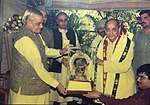
International Awards
- Mahamahopadhyaya P. V. Kane Gold Medal, The Asiatic Society of Mumbai, 1983.[10]
- Honorary Fellowship by The Asiatic Society of Mumbai, 1995.[10]
- Srivani Alamkarana by Ramkrishna Jayadayal Dalmia Shrivani Nyas, New Delhi, 1999. Bestowed by the Prime Minister of India (Late) Atal Bihari Bajpayee[88]
- Vishwabharati Award, Uttar Pradesh Sanskrit Sansthan, Lucknow 2005.[89]
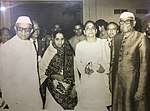
National Awards
- Certificate of Honour by President of India, Honorable Neelam Sanjeev Reddy in 1978: the highest literary award for lifetime achievement in Sanskrit, youngest ever recipient.[7]
- Sahitya Akademi Award,[9] Sahitya Akademi, New Delhi, 1991.
- Kalpavalli Puraskar, by Bharatiya Bhasa Parishad,[90] Calcutta, 1993.
- Vacaspati Puraskar, by K.K. Birla Foundation, New Delhi, 1997.[91]
- Honorary Emeritus Fellowship, by University Grants Commission,[92] New Delhi, 1991-1993.
- Rashtriya Sanskrit Veda Vyasa Puraskar of 2005, conferred by University Grants Commission,[93] New Delhi, 2010.
- Nana Saheb Peshwa Dharmika and Adhyatmika Puraskara, Devadeveshvara Sansthana,[94] Pune, 2010.
- Maharsi Vedavyasa Samman, Delhi Sanskrit Academy,[95] New Delhi, 2012.
- Sauharda Samman, Uttar Pradesh Hindi Sansthan,[96] Lucknow, 2015.
- Vishvabharati Samman, Vishvaradhya Jagadguru, Jangambadi Math, Varanasi 2017.
- Kabir Samman, Highest Literary Honor of Govt. of Madhya Pradesh, Ministry of Culture[97] for outstanding contribution to Indian Poetry, awarded by India's President Mahamahim Ramnath Kovind, Bhopal, 2017.
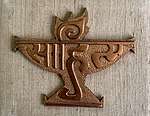
State and Local Awards
- Four times Sahitya Puraskara, Uttar Pradesh Sanskrit Sansthan,[98] Lucknow, 1975, 1979, 1980,1982.
- Two times Mitra Puraskara, Madhya Pradesh Sahitya Parishad, Bhopal, 1965, 1971.
- Bhoja Puraskara, Madhya Pradesh Sanskrit Academy, Bhopal, 1980.
- Vishista Puraskar, Uttar Pradesh Sanskrit Sansthan,[98] Lucknow, 2002.
- Valmiki Puraskara, Uttar Pradesh Sanskrit Sansthana,[98] 2004.
- Karpatraswami Puraskar, Sampoornanand Sanskrit University,[99] Varanasi, 2018.
- Chawbe Vishvesvaranath Medal, for standing first in Acharya Exams, Banaras Hindu University, 1956.
- Senior Academic Award Medal, Banaras Hindu University, Varanasi, 1985.
- Distinguished Alumnus Award, Banaras Hindu University, Varanasi, 2009.

Honorary Titles
- Sahitya Ratna, from Jagadguru Shankaracharya of Kanchi Peetha Swami Jayendra Sarasvati, 2010.[100]
- Pandita Ratna, from Shri Ramabhadracharya Vikalanga Vishvavidyalaya, Chitrakuta, 2008.[101]
- Ratna Sadasya, the highest honorary fellowship of Kalidasa Sanskrit Akademi, Ujjain 2007.[102]
- Mahamahopadhyaya, by Hindi Sahitya Sammelan, Allahabad, 2003.
- Mahamahopadhyaya, by Shri Lalabahadura Shastri Kendriya Sanskrit Vidyapeetha, New Delhi, 2009.[103]
- Mahamahadhyapaka, by Shri Kashi Pandit Sabha, Varanasi,1978.
- Abhinavakalidasa, from Sarada-Jyotish-peethadhishvara Jagadguru Shankaracharya Swami Swaroopanand Sarasvati, 2003.
- Shastrarthashri, from Uttar Pradesh Nagakupa Shastrartha Samiti, Varanasi, 2007
- Sastrakalanidhi, at the Centenary Celebrations of the Madras Sanskrit College, Madras, 2006.[104]
- Vidyashri from Vidyashridarmarthanyas, Jagadguru Shankaracharya Swami Shri Swaroopanand Saraswati, 2011.
- Prajnanabharati from Shri Satyananad Devayatan, Yadavapur, Kolkata, 2011.[105]
- Vagyoga Samman, Vagyoga Chetana Peetham, Varanasi, 2015.[106]
- Sanskritavidvadgauravam, BAPS Swaminarayan Shodh Sansthan Akshardham, New Delhi, 2019.[107]
- Mahamahopadhyay Acharya Pandit Ramprasad Tripathi Smriti-Puraskar, from Akhil Bharatiya Darshan-Parishad, Bhopal, 2019.
Citations and References
- Acharya Dwivedi was declared a 'Literary Giant,' and his contributions considered 'Monumental' in a 2009-2010 Sahitya Ratna citation (see image of this citation below).
- Acharya Dwivedi has written nearly 13,000 Sanskrit verses in epics and lyrics under eighteen titles (listed in the Original Literature section below). Kalidasa wrote about 2500 Sanskrit verses in 4 titles. Shakespeare wrote about 6300 lines in 5 different poems and 154 sonnets, which could be equated to about 3150 two-line verses, or about 1575 four-line verses, the two typical formats in Sanskrit.
- "Kālidāsa", Simple English Wikipedia, the free encyclopedia, 14 July 2019, retrieved 8 January 2020
- "Open Source Shakespeare: search Shakespeare's works, read the texts". www.opensourceshakespeare.org. Retrieved 8 January 2020.
- Please see the "Works: Literary Output" section below.
- Acharya Dwivedi has written over 13,000 verses in 3 epics and 14 lyrics, 2 plays, 5 books on his original new theories on Sanskrit literary principles and theorems, and 32 major books that preserve the works of about 35 major authors of the last millennium for future generations. In one lifetime, no literary scholar has had more output in Sanskrit literature in the past two millennia.
- "The Presidential Award of Certificate of Honour to Sanskrit, Pali, Prakrit, Arabic, Persian, Classical Oriya, Classical Kannada, Classical Telugu and Classical Malayalam Scholars and Maharshi Badrayan Vyas Samman for young scholars in the same field | Government of India, Ministry of Human Resource Development". mhrd.gov.in. Retrieved 18 December 2019.
- "Rewa Prasad Dwivedi - Sanskrit Writer: The South Asian Literary Recordings Project (Library of Congress New Delhi Office)". www.loc.gov. Retrieved 8 January 2020.
- "..:: SAHITYA : Akademi Awards ::." sahitya-akademi.gov.in. Retrieved 18 December 2019.
- "Fellowships and Medals". asiaticsociety.org.in. Retrieved 17 December 2019.
- "History". asiaticsociety.org.in. Retrieved 18 December 2019.
- "Google Maps". Google Maps. Retrieved 19 December 2019.
- "Adhunik Sanskrit Sahitya Pustakalaya". www.sanskrit.nic.in. Retrieved 18 December 2019.
- "Banaras Hindu University, Varanasi". www.bhu.ac.in. Retrieved 19 December 2019.
- "Banaras Hindu University", Wikipedia, 9 January 2020, retrieved 14 January 2020
- "BHU : Banaras Hindu University". www.bhu.ac.in. Retrieved 19 December 2019.
- "Banaras Hindu University, Faculty of Arts, Department of Sanskrit, Varanasi". www.bhu.ac.in. Retrieved 18 December 2019.
- "IndCat". indcat.inflibnet.ac.in. Retrieved 22 December 2019.
- Encyclopaedic Dictionary of Sanskrit Literature (2003), pp. 427–429
- Special Report – 100 years of establishment of Banaras Hindu University (BHU), retrieved 18 December 2019
- "BHU: Banaras Hindu University". www.bhu.ac.in. Retrieved 18 December 2019.
- "vikramuniversity – Vikram University, UJjain". Retrieved 10 January 2020.
- "Google Maps". Google Maps. Retrieved 23 December 2019.
- "Annual Meeting – American Oriental Society". www.americanorientalsociety.org. Retrieved 17 December 2019.
- "Houghton Library". Harvard Library. Retrieved 17 December 2019.
- "Publications". www.sanskrit.nic.in. Retrieved 17 December 2019.
- "IGNCA National Seminar on Rewa Prasad Dwivedi".
- संस्कृत साहित्य के वटवृक्ष: Attribute to Acharya Rewa Prasad Dwivedi.
- "Amazon.in: Bela Malik: Books". www.amazon.in. Retrieved 18 December 2019.
- Rani, Kamlesh (2016). Arvācīna Saṃskr̥ta mahākāvya-paramparā meṃ Revāprasāda Dvivedī ke mahākāvya. Pratibha Prakashan, Delhi, India: Pratibha Prakashan. pp. 348 pages. ISBN 9788177023862.
- Malik, Bela. "Rewa Prasad Dwivedi vyaktittva evam krititva (a thesis at Rajasthan University, Jaipur, India)". indcat.inflibnet.ac.in. Retrieved 22 December 2019.
- Singh, Annu. "Dr Rewa Prasad Dwivedi krit kavyalankar karika ka sameekshatmak adhyayan (a thesis at Rani Durgawati University, Jabalpur, India)". indcat.inflibnet.ac.in. Retrieved 22 December 2019.
- Saxena, Abha Rani. "Sanskrit sahitya mein upalabdha sita charitra sambandhi samagri ke paruprekshya mein Shri Rewa Prasad Dwivedi Sanatan krit Sita Charitam Mahakavya ka sameekshatmak evam tulanatmak adhyayan (a thesis at Mahatma Jyotiba Phule Rohilkhand University, Bareilly, India)". indcat.inflibnet.ac.in. Retrieved 22 December 2019.
- Banshi, Indu. "Rajendra Mishra krit janaki jeevanam evam Rewa Prasad Dwivedi krit sita charitam ka sameekshatmak adhyayan (thesis at Dayalbagh Educational Institute, Agra, India)". indcat.inflibnet.ac.in. Retrieved 22 December 2019.
- "Rewa Prasad Dwivedi - Sanskrit Writer: The South Asian Literary Recordings Project (Library of Congress New Delhi Office)". www.loc.gov. Retrieved 18 December 2019.
- 3-Sanskr̥ta kāvya śāstra lecture by Acharya Rewa Prasad Dwivedi, retrieved 18 December 2019
- Lecture on some critical points of Sanskrit poetics by Acharya Rewa Prasad dwivedi, retrieved 3 January 2020
- Sanskrit Kavyashastra By Acharya Rewa Prasad Dwivedi, retrieved 18 December 2019
- पंचदश दिवसीय कार्यशाला - स्मृतितत्त्वविमर्श - पञ्चम दिवस- ११.०६.२०१९, retrieved 24 December 2019
- Rashtriya Sangoshthi Part-1.7 , Bharat Adhyayan Kendra, BHU, retrieved 18 December 2019
- Prof. Rewa Prasad Dwivedi, eminent Sanskrit author and scholar, retrieved 24 December 2019
- Some important point of sanskrit poetics by great sanskrit scholar Acharya Rewa Prasad Dwivedi, retrieved 24 December 2019
- पंचदश दिवसीय कार्यशाला - स्मृतितत्त्वविमर्श - चतुर्दश दिवस - २१.०६.२०१९, retrieved 24 December 2019
- "BHARATA ADHYAYANA KENDRA". www.bhu.ac.in. Retrieved 18 December 2019.
- "Current Faculty of Sanskrit Department". vssdcollege.ac.in. Retrieved 19 December 2019.
- "Google Maps". Google Maps. Retrieved 19 December 2019.
- "Google Maps". Google Maps. Retrieved 19 December 2019.
- Dwivedi, Rewa Prasad (1968). Sītācaritam (in Hindi). Saṃskr̥tapariṣad, Sāgaraviśvavidhyālayaḥ ; Sudhīraprakāśanam, Rāyapuram.
- "Adhunik Sanskrit Sahitya Pustakalaya". www.sanskrit.nic.in. Retrieved 18 December 2019.
- Dwivedi, Rewa Prasad (1990). Svātantryasaṃbhavam: 28 sargātmakaṃ mahākāvyam, 1857-1984 gato Bhāratetihāsaḥ (in Hindi). Kālidāsa Saṃsthānam.
- Dwivedi, Rewa Prasad (2000). Svāntryasambhavamahākāvyam: 1-33 sargātmakam (in Hindi). Kāśīhindūviśvavidyālaya.
- "Adhunik Sanskrit Sahitya Pustakalaya". www.sanskrit.nic.in. Retrieved 18 December 2019.
- Encyclopaedic Dictionary of Sanskrit Literature (2003), p 428
- Dwivedi, Rewa Prasad; Dvivedī, Sadāśivakumāra (2002). Kumāravijayamahākāvyam (in Hindi). Kālidāsasaṃsthānam.
- Dwivedi, Rewa Prasad; Dvivedī, Sadāśivakumāra (2003). Śrīrevābhadrapīṭham: 152 padyātmakaḥ Śrīnarmadāstavaḥ (in Hindi). Kālidāsa Saṃsthāna.
- Dwivedi, Rewa Prasad (2002). Śaraśayyā (in Hindi). Kālidāsasaṃsthānam.
- Dwivedi, Rewa Prasad (1988). Pramathaḥ: paramāṇuyugīyāni nava kāvyāni (in Hindi). Kālidāsa Saṃsthānam.
- Dwivedi, Rewa Prasad (1987). Śatapatram: kavitāviṣayakaṃ Saṃskr̥tapadyaśatakam (in Hindi). Kālidāsasaṃsthānam.
- Dwivedi, Rewa Prasad (2001). Matāntaram: yugāntaranāndī (in Hindi). Kālidāsasaṃsthānam.
- Dwivedi, Rewa Prasad (2000). Śakaṭāram: mānavapratāḍanākāvyam (in Hindi). Kālidāsasaṃsthānam.
- Dwivedi, Rewa Prasad (2001). Sarabhaṅgam: adhyātmarahasyakāvyam (in Hindi). Kālidāsa Saṃsthānam.
- Dwivedi, Rewa Prasad (2000). Saptarṣikāṅgresam: daśāṅkaṃ nāṭakam (in Hindi). Kālidāsasaṃsthānam.
- Dwivedi, Rewa Prasad (1976). Yūthikā (in Hindi). Saṃskr̥taprakāśanam.
- Dwivedi, Rewa Prasad (1977). Kāvyālaṅkārakārikā: Abhinavaṃ kāvyaśāstram (in Sanskrit). Caukhambā Surabhāratī Prakāśana.
- "Alam Brahma by Rewaprasada Dwivedi at Vedic Books". www.vedicbooks.net. Retrieved 10 January 2020.
- Kālidāsa; Dwivedi, Rewa Prasad (1986). Kālidāsa-granthāvalī (in Hindi). Kāśī-Hindū-Viśvavidyālayaḥ.
- "Publication – कालिदास संस्कृत अकादेमी,उज्जैन,म. प्र". Retrieved 18 December 2019.
- Dwivedi, Rewa Prasad and Sadashiv Kumar (2017). Kalidas-Shabdanukramkoshah. Varanasi, India: Kalidasa Sansthan, Varanasi. p. 740. ISBN 978-8192642796.
- "Journal of the Asiatic Society of Mumbai". asiaticsociety.org.in. Retrieved 10 January 2020.
- Dwivedi, Rewa Prasad (1973). Kālidāsaḥ, mānavaśilpī mahākaviḥ (in Hindi). Saṃskr̥tapariṣad, Sāgaraviśvavidyālayaḥ.
- Kālidāsa; Dwivedi, Rewa Prasad; Aruṇagirinātha; Nārāyaṇapaṇḍita; Viśvavidyālaya, Sampūrṇānanda Saṃskr̥ta (2004). Kālidāsapraṇītaṃ Kumārasambhavamahākāvyam (in Hindi). Sampūrṇānanda Saṃskr̥ta Viśvavidyālaya.
- Hemādri; Kālidāsa; Dwivedi, Rewa Prasad (1973). Raghuvaṃśadarpaṇaḥ (in Hindi). Kāśīprasādajāyasavāla-anuśīlanasaṃsthānanideśakena.
- Bedekar, V. M. (1975). "Review of RAGHUVAṀŚA-DARPAṆA, Hemādri". Annals of the Bhandarkar Oriental Research Institute. 56 (1/4): 259–262. ISSN 0378-1143. JSTOR 41691576.
- Kālidāsa; Dwivedi, Rewā Prasāda (1990). The Rt̥usaṃhāra of Kālidāsa. Sahitya Akad. ISBN 978-81-7201-019-5.
- Kalidasa; Dwivedi, Rewa Prasada; Radhakrishnan, S. (1990). Rtusamhara of Kalidasa. New Delhi: Sahitya Akademi. ISBN 978-81-7201-019-5.
- Dwivedi, Rewa Prasad (2007). संस्कृतकाव्यशास्त्र को आलोचनात्मक इतिहास: 300 ई. पू. से 2005 ई. सन् तक (in Hindi). कालिदाससंस्थान.
- श्रृंगारप्रकाशः [साहित्यप्रकाशः], ग्रंथकृद, भोजराजः: Shringar Prakasha (Set of 2 Volumes).
- Dwivedi, Rewa Prasad Dwivedi & Sadashiv Kumar (2014). SAhityashastrasamucchaya Vol.- I - Dandi, Bhamah, Udbhat, Vaman, Rudrat - Original Edited Texts. Kalidas Sansthan, 28 Mahamanpuri, PO- BHU, Varanasi - 221005.
- Dwivedi, REwa Prasad Dwivedi and Sadashiv Kumar (2013). Sahityashastrasamucchaya Vol.- II - Dhvanyaloka of Anandavardhan with Lochana of Abhinavagupta. Kalidas Sansthan, 28 Mahamanpuri, PO- BHU, Varanasi - 221005.
- Mahimabhaṭṭa; Ruyyaka; Dwivedi, Rewa Prasad (1964). Vyakttivivekaḥ (in Hindi). Caukhambā Saṃskr̥ta sīrīja āphisa.
- अलंकार सर्वस्व: Alamkara Sarvasva.
- Dwivedi, Rewa Prasad (1972). Ānandavardhana: Ācārya Ānandavardhana ke kāvyaśāstrīya siddhānta-krama, punarnirdhāraṇa, cintana (in Hindi). Madhyapradeśa Hindī Grantha Akādamī.
- "Buy Bharata's Natyasastra online - Indian Institute of Advanced Study". books.iias.org. Retrieved 18 December 2019.
- "संस्कृतभारती | Samskrita Bharati". www.samskritabharati.in. Retrieved 10 January 2020.
- अभिधावृत्तमातृका : Abhidhavrttamatrka By Rajanka Mukula.
- Mammaṭācārya (1981). Kāvyaprakāśaḥ (in Sanskrit). Kāśīhindūviśvavidyālayaḥ.
- Śiṅgabhūpāla; Dwivedi, Rewa Prasad (1969). Śiṅgabhūpālapraṇīto Rasārṇavasudhākaraḥ (in Hindi). Saṃskr̥tapariṣad, Sāgaraviśvavidyālayaḥ.
- [[[Atal Bihari Vajpayee]] "Atal Bihari Vajpayee"] Check
|url=value (help), Wikipedia, 7 December 2019, retrieved 19 December 2019 - "Official Website of Uttar Pradesh Sanskrit Sansthan, Uttar Pradesh, India:: / Important Schemes / Award Scheme". upsanskritsansthanam.in. Retrieved 19 December 2019.
- "Bharatiya Bhasha Parishad". www.bharatiyabhashaparishad.org. Retrieved 22 December 2019.
- "K.K. Birla Foundation". web.archive.org. 21 December 2013. Retrieved 22 December 2019.
- "UGC:Emeritus". www.ugc.ac.in. Retrieved 22 December 2019.
- "Honours & Awards". www.ugc.ac.in. Retrieved 22 December 2019.
- "SDSPune". sdspune.in. Retrieved 22 December 2019.
- "Delhi Sanskrit Academy". sanskritacademy.delhi.gov.in. Retrieved 22 December 2019.
- "Up Hindi Sansthan Home Page". uphindisansthan.in. Retrieved 22 December 2019.
- "Directorate Of Culture, Govt. Of M.P." www.culturemp.in. Retrieved 22 December 2019.
- "Official Website of Uttar Pradesh Sanskrit Sansthan, Uttar Pradesh, India". upsanskritsansthanam.in. Retrieved 22 December 2019.
- "Welcome to the Sampurnanand Sanskrit Vishwavidyalaya, Sampurnanand Sanskrit University Varanasi, Varanasi Sanskrit University, Universities in Varanasi, Sanskrit University in UP ,Sanskrit University in India". www.ssvv.ac.in. Retrieved 10 January 2020.
- "Shri Kanchi Kamakoti Peetham". www.kamakoti.org. Retrieved 10 January 2020.
- "Jagadguru Rambhadracharya Handicapped University – Accredited with "B" Grade By NAAC". Retrieved 10 January 2020.
- "About Kalidasa – कालिदास संस्कृत अकादेमी ,उज्जैन ,म. प्र". Retrieved 22 December 2019.
- "Home | Shri Lal Bahadur Shastri Rashtriya Sanskrit Vidyapeetha". www.slbsrsv.ac.in. Retrieved 10 January 2020.
- "Madras Sanskrit College". madrassanskritcollege.edu.in. Retrieved 22 December 2019.
- "Sree Satyananda Mahapeeth – Devoted to the Service of Humanity". Retrieved 10 January 2020.
- "Sanskrit, Kundalini Meditation, Tantra, Yoga, Mnemonic Sanskrit". www.vagyoga.co.in. Retrieved 10 January 2020.
- "BAPS Swaminarayan Research Institute". swaminarayanresearch.akshardham.com. Retrieved 22 December 2019.
External links
- A United States Library of Congress web-page dedicated to Acharya Rewa Prasad Dwivedi's literature and voice recording of his own literature: LOC Overseas
- A national one-day seminar hosted by India's Indira Gandhi National Center for the Arts on the life and works of Acharya Reva Prasad Dwivedi: http://ignca.gov.in/events/sanskriti-samvaad-shrinkhala-9-varanasi-mahaopadhayay-acharya-reva-prasad-dwivedi/
- Encyclopedic Dictionary of Sanskrit Literature (pp 427-429), by, J.N. Bhattacharya & Nilanjana Sarkar, ISBN 978-81-8220-780-6, 2nd Edition, 2016; Global Vision Publishing House: http://globalvisionpub.com/globalbooks/index.php?route=product/product&filter_name=sanskrit&product_id=2475
- https://indcat.inflibnet.ac.in/index.php/main/theses: Online catalog of publications, theses, etc. of major Indian Universities.